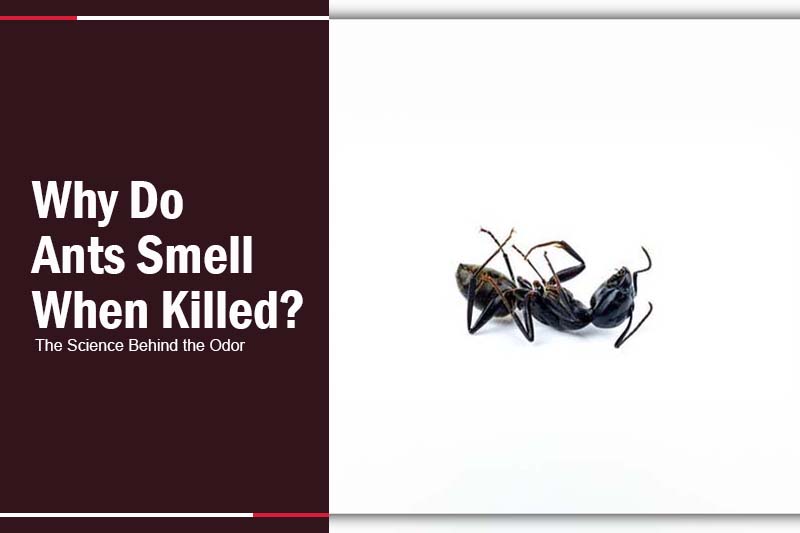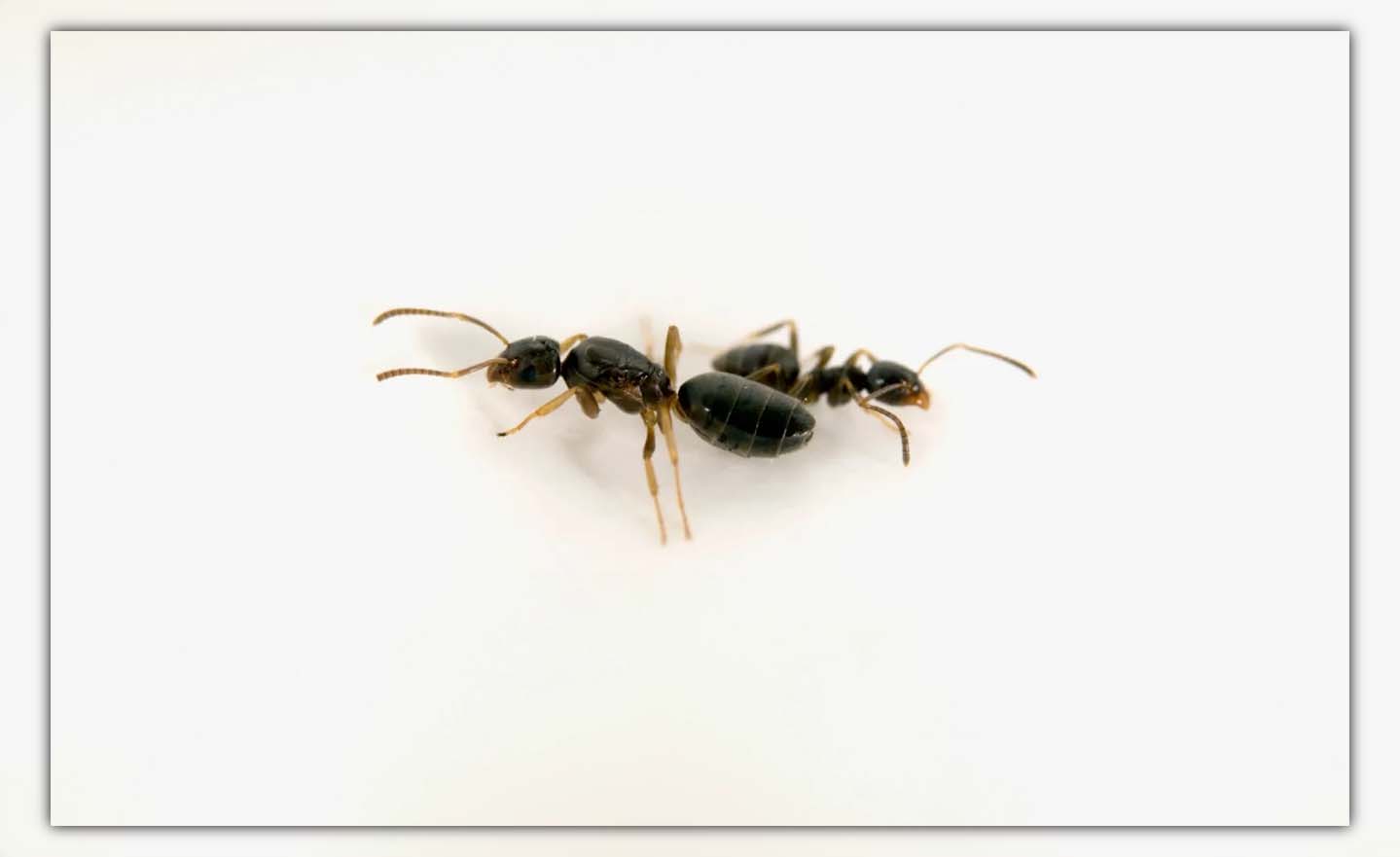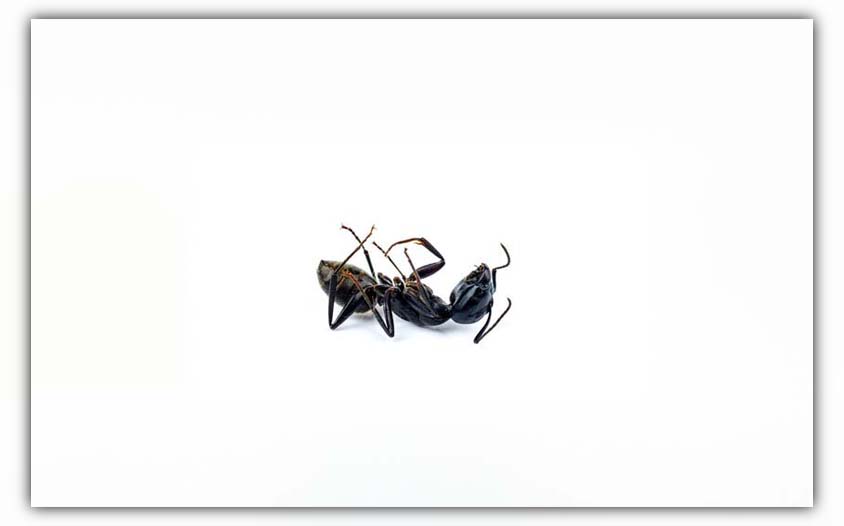Have you ever noticed a strange smell after killing some ants in your home or garden? Do you wonder what causes this smell and what it means for you and your plants? If you answered yes to these questions, then you need to read this blog post.
Ants smell when killed because they release a chemical called formic acid, which is used for communication and defense among ants.
In this article, you will learn how ants use formic acid, how it affects you and your plants, and how to get rid of the ant smell after killing them.
Which Ants Smell When You Kill Them?
When you crush these stubborn ants, they release a smell that resembles rotten coconut.
Interestingly, an ant that dies naturally can have a different smell, more like olive oil.
This is because of the oleic acid that ants produce two days after death. This acid is not the same as the one from the crushed ants, but it has the same function: to signal other ants that they need to remove the corpse.
Ants take their dead to special places to avoid bacteria.
Why Do Ants Smell When You Squish Them?
Many ants have a powerful odor that they release when they are killed. This is a way of protecting themselves from predators in the wild.
Many animals use their sense of smell to hunt for food.
When your nose is much more sensitive than a human’s, a bad smell is much more unpleasant. Being smelly means, you’re not tasty as food.
Of course, there are some animals like anteaters, lizards, and bears who don’t care.
Why Do Ants Smell Like Ink When You Kill Them?
Ants that have a strong ink-like smell because they produce formic acid in their bodies. Formic acid is a simple organic acid that humans also use for various purposes, such as an antibacterial agent in animal feed and a preservative in food. Moreover, formic acid is an ingredient in some types of ink, especially those used for sintering. Sintering is a process that turns a powder into a solid without melting it, usually by applying high pressure and low heat.
Formic acid, also known as methanoic acid, is a natural chemical that ants make themselves. Ants use formic acid not only for defense, but also for offense. They can spray formic acid to repel predators, similar to skunks. They can also inject formic acid into their prey to kill or paralyze them.
Why Do Ants Smell Like Chemicals When You Kill Them?
Ants release chemicals from their bodies when they die, which gives them a strong chemical smell. You can smell something similar in spoiled food that is decomposed by penicillin mold.
Even though a single ant has only a small amount of this smelly substance, it can still annoy a human. Our noses are not very good compared to other animals.
A little bit of formic acid or methyl ketones can create a lot of odor. This is why ants use these chemicals for protection, attack, and communication with their colony.
Why Do Smashed Ants Smell Like Gasoline?
Ants release formic acid and methyl ketones when they die, which humans perceive as gasoline or nail polish remover. Humans have a poor sense of smell compared to other animals.
Therefore, something that a dog, cat, or ant can distinguish and identify easily only smells like something similar to us.
Humans interpret what they smell based on their personal experience, so ants may smell more like gasoline if we are familiar with that odor.
How to get rid of ant smell after killing them?
After killing ants, often your home will have a lingering disgusting smell. As long as dead bodies of ants are lying around and there are traces of chemicals they release, your house will have a foul smell. Here are some acts that help in getting rid of the scent left by odorous ants:
Vacum
One way to get rid of ant smell involves vacuum cleaning your space. Vacuuming helps clean up and collect all the chemicals released by dead ants, dead and alive ants, and their droppings for disposal.
Vinegar
Adding white vinegar to mature or warm water can help in getting rid of the smell left by ants after killing them. Vinegar for cleaning the smells also helps make your space smell-free.
Basically, vinegar is an ordinary cleaner available in most homes. It is very successful in its application for removing different odors. You can fill bowls with vinegar and position them in distinct areas inside the house. Vinegar is capable of pulling ant smell from the air.
Alternatively, boil one tablespoon of vinegar and a cup of water. Once done boiling the mixture, reduce the heat so that it simmers. The solution will freshen up the air and rid it of any foul odors.
Consult a professional
In case getting rid of ant smell after you have killed them is proving challenging, you have the option of hiring a professional pest control company. Understandably, it is possible you are short of time and knowledge to kill ants and eliminate their stinking smell.
An ant exterminator will thoroughly inspect your property to know about the level of infestation and what is attracting the pests and offer practical solutions. Because experienced exterminators have dealt with ant infestation plenty of times, they come with a bag of tricks to control and prevent an attack.
But, hiring a pest control expert will cost you some money. In addition, it needs a lot of time to kill ants and get rid of the chemical smell.
Is the smell produced after killing ants dangerous?
The smell produced after killing rants is not dangerous to your health. The scent will only irritate you if you detect it since it is smelly. Ants release the chemical not to endanger you but to communicate with each other and distinguish between a colony mate and an invader.
Dead ants use the chemical to warn others that there is danger and that they should run away to safety or come help defend the colony.
The only thing you need to be aware of is to avoid as much as possible an ant sting or bite. Though the sting is often mild since the insects are too small, still, a bite is capable of causing unpleasant symptoms and allergic reactions.
The nasty smell that offends your nose and irritates you when you kill ants is not part of a revenge mission. Whatever your senses make of the smell, it is a strategy that ants use to become better at searching and finding food and warning each other about a danger to work together to survive.
In conclusion, with the knowledge that only some ants produce smelling odors and the reasons behind the smell, keep your home from an ant infestation.
Apply the right strategies to prevent and control ant attacks. The plan should not involve splitting up a colony that worsens your troubles. If they are not an issue, you will not have to kill ants and deal with their nasty smelling odors.
How to keep stinking ants away?
Focus on preventing attacks by the smelly ants by trying out the following tips.
- Sprinkle powdered products with unpleasant flavors on points of entry for ants. Black pepper, baking soda, and diatomaceous earth are great options. Or, Seal points of entry with paint or caulk.
- Spray essential oils with strong smells such as vinegar and lemon on surfaces in every room to discourage ant attacks.
- Always clean your living space with soapy water. Put more effort into the kitchen and clean dishes, tables, and countertops. Cleaning ensures no food, especially crumbs, is unavailable to attract odorous ants.
- Do not make food available to the insects. Place your food in the fridge or inside airtight containers or resealable plastic bags.
- Take apart potential nesting locations of ants like piles of debris or wood.
- Prune and trim the shrubs and tree branches around your home to avoid contact with your structures.
- Keep your mulch a reasonable distance away from the foundation of your buildings.
- Empty the kitchen trash bin frequently.
Conclusion
You have learned the answer to the question: why do ants smell when killed? You have discovered that ants produce different chemicals in their bodies, such as formic acid and methyl ketones, that they use for communication, defense, and offense.
We hope you enjoyed this blog and found it useful and informative. If you want to learn more about pest control and gardening, please check out our other blogs at Pestweek.

Calina Mabel has over 15 years of experience in the field of journalism and communications. Currently, Calina Mabel is the Content Writer for categories such as Cockroach, Ants, Bed Bugs, Mosquito, Rodent, Termite, and Flies on Pestweek.com. She aims to build content for these categories with a focus on providing valuable and accessible information to readers, in order to create the world’s largest knowledge community about Pests.
All content written by Calina Mabel has been reviewed by Emily Carter.




